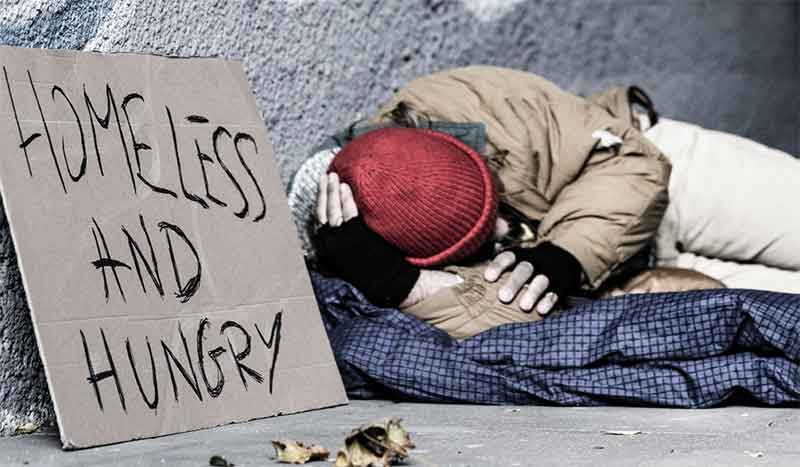
Perhaps the most disturbing trend in the UK in recent times has been the increase in poverty and related distress. According to the UK Poverty 2024 Report, more than one in five people, or 22% of the total number of people in the UK, are living in poverty. These add up to a little over 14 million people (out of a total population of about 68 million)—8.1 million in the working age group, 2.1 million pensioners and 4.2 million children. Poverty is highest among children, with three among ten children—or 30%–living in poverty.
6 million people are living in deep poverty. 3.8 million people here are living in destitution, deprived of the most basic needs.
On average people living in poverty are 29% below the poverty line level. In the case of people living in deep poverty, on average they are 59% below the poverty line.
Danny Darling of University of Oxford has written in a recent paper with the tell-tale title ‘Getting Shorter, Growing Hungrier—How Children in the UK Live Today’ (The Conversation, September 16, 2024) that the poorest 20% of the households in the UK are today poorer than the poorest 20% households of most countries of East Europe. The extent of poverty at the level of children can be seen in the declining height of children since 2010.
The Lancet stated in an editorial titled ‘Britain is broken—poor child health proves it’ (February 2, 2019), “Today more than 4 million, children in the UK, or 1 in 3, live in poverty, an increase of 500,000 in the past 5 years, Child poverty rates are predicted to reach a shocking 40% by 2030…The socio- economic determinants of health in the UK are deteriorating. Britain feels broken. That 1 in 3 children is living in poverty in the world’s fifth largest economy is nothing short of a disgrace.”
UN Special Rapporteur on Extreme Poverty and Human Rights Philip Alston wrote after a visit to UK in November 2018, “This (high poverty level) is obvious to anyone who opens their eyes to see the immense growth in food-banks and the queues waiting outside them, the people sleeping rough in the streets, the growth of homelessness, the sense of deep despair that that leads even the government to appoint a minister for suicide prevention and civil society to report in depth on the levels of loneliness and isolation. And local authorities, especially in England, which perform vital roles in providing a real social safety net, have been gutted by a series of government policies. Libraries have been closed in record numbers. Public spaces and buildings including parks and recreation centers have been sold off.”
Poverty levels are significantly higher for some minorities. For people of Bangladesh and Pakistan poverty levels are 51%, compared to the national average of 22%.
In recent years several governments and prime ministers have come and gone but high poverty levels have persisted.
At the same time as increasing poverty and related distress at home, distorted policies have also increased distress abroad. UK has been the closest collaborator in the US-led War on Terror which has caused massive destruction in several countries including Iraq, Libya, Afghanistan and others. According to Brown University estimates the War on Terror has claimed 0.9 million lives directly in violence and at least about 3.6 million lives indirectly due to war –related deprivation and disease (total at least 4.5 million, still counting). At least 38 million people have been displaced. UK has also been supporting other extreme aggressions, even genocidal actions, such as those of Israel on the Palestinians and others. The Ukraine war has been hugely destructive, causing massive distress and creating even bigger potential risks, including the possibility of nuclear war and the Third World War. UK was complicit in provoking it by being a strong supporter of NATO’s eastward expansion, by facilitating Ukraine’s 2014 coup and by sabotaging the Istanbul peace negotiations at an early stage of Russia’s invasion.
UK has also contributed a lot to increasing avoidable distress in several countries by supporting the sanctions unjustly forced on several countries.
Subscribe to Our Newsletter
Get the latest CounterCurrents updates delivered straight to your inbox.
These policies have also increased risks for the UK and its people in several contexts. In case of a wider war, the UK will be more at risk compared to the USA due to its location and size. Loyal following of the USA in its aggressive policies has not only made the UK more vulnerable, it has also led to the denial of the best available trading and other economic options in important contexts.
Should the UK follow the highly aggressive agenda of the USA, or should it use its historic close ties with the USA to bring it closer to an enlightened agenda of peace?
People in UK should mobilize strongly and sustainably for policy changes which reduce distress and risks at home and abroad, instead calling for an agenda based on peace, justice and safety.
Bharat Dogra is Honorary Convener, Campaign to Save Earth Now. His recent books include Protecting Earth for Children, Planet in Peril, Man over Machine and A Day in 2071.















































